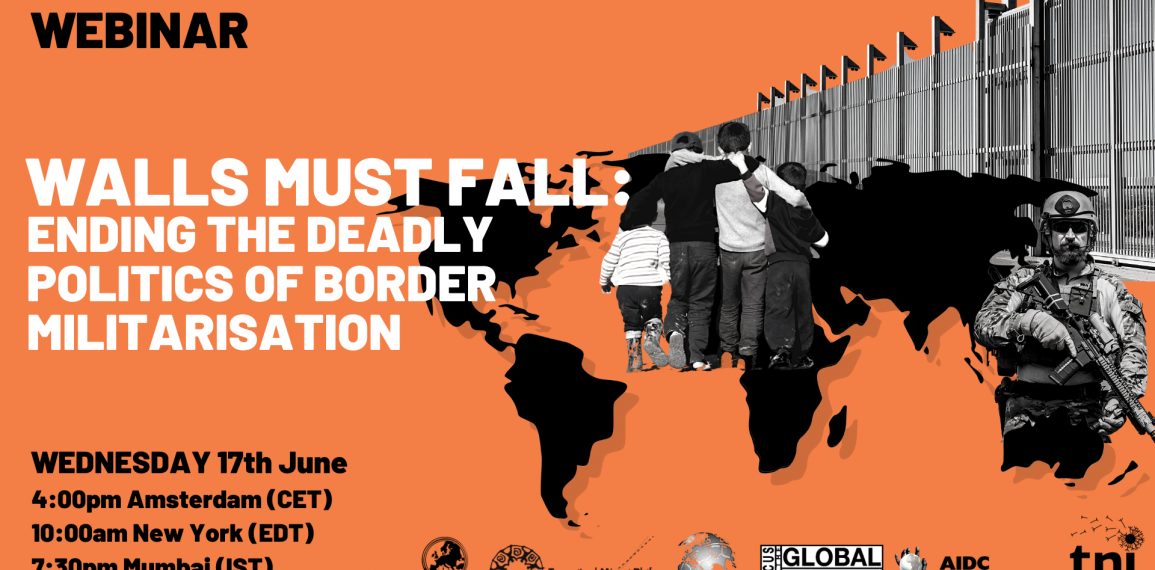Webinar: Walls Must Fall - Ending the Deadly Politics of Border Militarisation
AEPF Working Group on Democratisation and Human Rights
Webinar collaboration with Trans National Institute, AEPF, Focus on the Global South, Alternative Information and Development Centre (South Africa).
Watch the Webinar Live
Speakers:
(1) Harsha Walia, author of Undoing Border Imperialism (2013)
(2) Jille Belisario, Transnational Migrant Platform-Europe
(3) Todd Miller, journalist and author of Empire of Borders (2020), Storming the Wall (2019) and TNI’s report: More than a Wall (2019)
(4) Kavita Krishnan, All India Progressive Women’s Association (AIPWA)
This webinar where AEPF collaborated was part of the TNI series around issues emerging from Covid-19, on issues not covered by the news with the aim of deepening action and understanding. The focus was to provide analysts and activists new ways of understanding. People from almost a 70-80 countries watch the TNI webinars and almost 1000+ people register. It was also translated into Spanish.
SUMMARY:
Harsha Walia, who is located in the indigenous territories of Ottawa, Canada spoke on border imperialism. When thinking of borders we tend to think of static external structures, however these are key methods of imperialism, militarism, xenophobic and elastic nationalism that keeps changing its site of control. Border governance is now both externalised and internalised. These border policies are used across the world and can exist anywhere. The key pillar is border imperialism. The narrative of border imperialism is that states (in the West but also India, Israel, Turkey, etc.) present themselves as victims and migrants have been made bargaining chips (Turkey etc.) And Colonialism and its history of making migrants and becoming settlers is erased. Further migrants are in many cases, being reorganised, into precarious labour and managed when required for capital generation and temporary farm workers.
During the Covid-19 Pandemic such border imperialism has increased as 57 countries have closed their borders. Harsha concluded by arguing for the freedom to return, to stay and move.
Tod Miller spoke of how the military industrial complexes (MIC) the defence industry and private security have entered into border management and Homeland Security in the US and in many countries world over in huge way. He explained from his empirical study of how billions are being spent by states but especially by the USA on managing borders and new walls being constructed. This has increased exponentially in the Trump era. Tod showed how a key state- Israel is involved in developing these technologies of surveillance from drones, iris scans, towers etc. These surveillance and control technologies are then ‘tried and tested’ on the Palestinian (people)-Israel borders. These are then exported world over.
Jille Bellisario presented a power point presentation that showed the externalization of borders. She used Europe as her case study. She said injustice for one is injustice for all. She presented slides to show how the Covid-19 virus has been used to end asylum policies and increase the harshness of border police.
Kavita Krishnan located her conversation in the context of South Asia and Asian migrations. She showed migration to be both a cross border as well as an internal rural to urban phenomenon, mostly by the most marginalised, landless peasantry and persecuted minorities in all of South Asia. Referring to how the Rohingyas had been harshly and forcefully pushed out of Myanmar and ethnic Tamils from Sri Lanka she showed the base of militarised politics against ethnic and religious minorities. Kavita dwelt on the issue of Bangladeshi refugees who had come into India since the Pakistan-East Pakistan conflict, when Bangladesh became a new state in 1971. This exodus from that time has been fuelled to an anti-Muslim phobia by the xenophobic forces in India. Currently this issue has morphed to create a chronology of citizenship laws that are exclusive and discriminatory towards Muslims in India.
Kavita gave examples of the lockdown in India and world over and how harsh these policies were on workers and labour. She showed how a medical crises had been couched in militarised/ communalised language.
All the speakers gave their support to the Black and indigenous liberation movements. And expressed solidarity with refugee and migrants movements as a step towards de-globalization.
All the speakers agreed that militarised border regimes and securitization of borders and both the external aspect as well as their internalization has only increased during the Covi-19 Pandemic. They all agreed on the need for freedom of movement and safeguarding rights of people impacted by this militarization and border control regimes.



